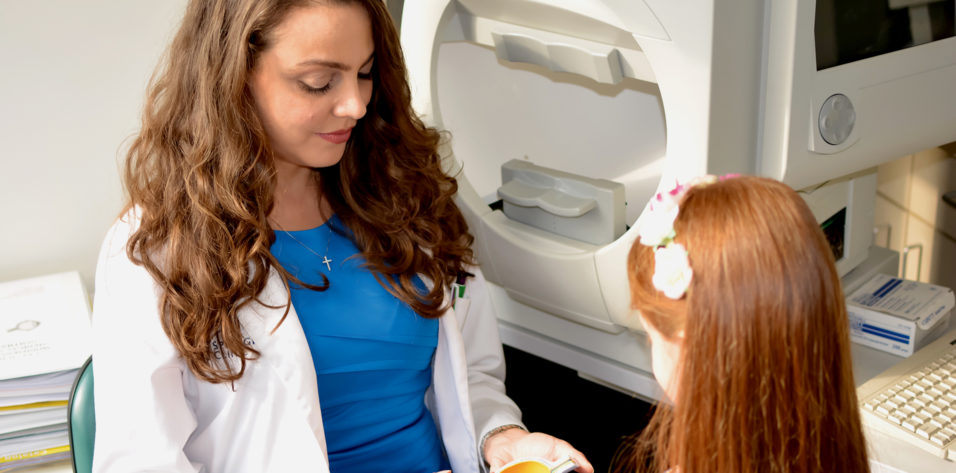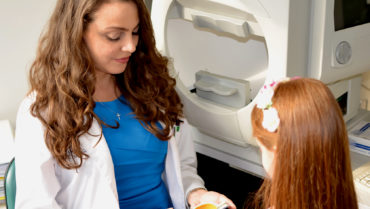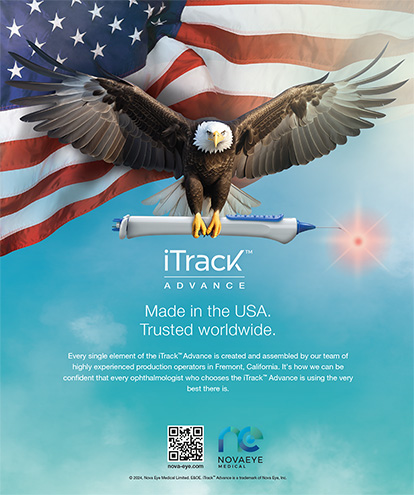
When ophthalmic surgeon Lisa M. Nijm opened Warrenville EyeCare & LASIK (www.warrenvilleeyecare.com) in the western suburbs of Chicago, she added some personal flair to her early networking efforts. “My initial marketing plan was a plate of cookies,” recalls Dr. Nijm. “I went to local optometrists, ophthalmologists, and primary care physicians and gave them cookies and my card and said, ‘I’m available to see your patients, and I can see them right away. I will take good care of them, and I will send them back to you.’” Given her credentials, Dr. Nijm didn’t have to sweeten the deal, but based on her reputation for thinking outside the box, it is no surprise that her initial foray into the suburban Chicago market was accompanied by a memorable calling card.
Dr. Nijm’s career to date has been a study in taking the extra step, teaching the extra course, earning the extra degree, and, she says, “going above and beyond to make sure no stone is left unturned” in her efforts to meet her patients’ needs. For example, she earned a dual MD/JD degree from Southern Illinois University School of Medicine and School of Law, and she explains that her education augments her belief that, “for physicians to truly care for their patients, we need to serve as advocates for them both in and out of the office.” After completing residency at the University of Illinois Eye and Ear Infirmary and a fellowship at the University of California at Davis, where she was the first female cornea fellow, Dr. Nijm worked in underserved regions of central Illinois.
A PRACTICE OF ONE’S OWN
After working in two other ophthalmology practices, Dr. Nijm decided to open her own in her hometown, where her father had an internal medicine practice. She recalls that her father’s motto was, “When you put patients first, everything else falls into place,” and she has made it her life’s work to follow that recommendation. She says she feels blessed to be serving the same community that her father did for 30 years and with his same philosophy. “At a time when patients are being rushed through the system, the goal of this practice is to devote the time and resources necessary to alleviate each patient’s concerns,” she says.
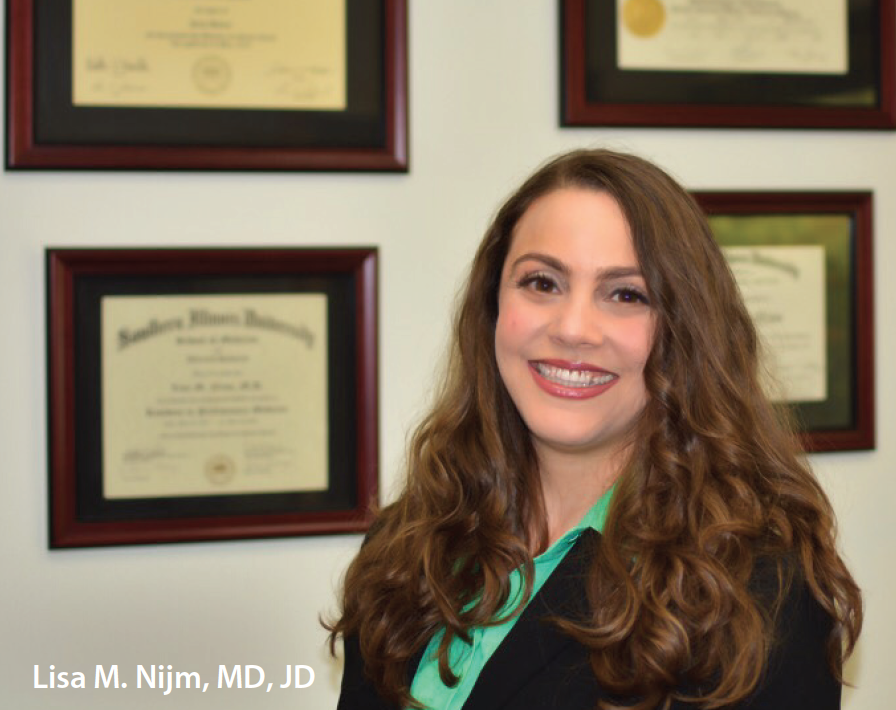
When Dr. Nijm hung her solo shingle, she started seeing patients in her father’s practice. “I started out with one room, and the remainder of the clinic was internal medicine,” she recalls. “Within a short time, my father, who sadly recently passed away, would warmly joke that I took over the whole office and he was barely left with a closet. All of my early patients were his patients first. I very much cherish the opportunity to care for his former patients.”
Dr. Nijm describes Warrenville EyeCare & LASIK, of which she is medical director, as a patient-centered boutique comprehensive practice with a focus on cornea, cataract surgery, and LASIK. “Patients can come in for whatever they need, and if I can’t provide it, I will help them find the best care,” she says. “I aim to transcend the patients’ expectations. From the minute they walk in, we create a memorable experience with a personal touch; we know our patients well and greet them by [their] first name. I show them the test results myself using the latest technology I have, be it a corneal topography or optical coherence tomography. Taking the extra time to explain the disease in terms they can understand engages the patient and makes a wealth of difference in their participation in their care.”
Really hearing patients’ concerns and appreciating their unique experiences is critically important, she points out. “The most underrated communication skill is listening; we do our best to carefully listen to our patients’ concerns and are always looking at ways to improve,” says Dr. Nijm. One way to “hear” what her patients have to say is by intermittently administering in-office patient satisfaction surveys. Another way she meets her goal of exceeding expectations is to evaluate new technology and medications on a continual basis. “I do this to ensure that my patients are being offered quality, cutting-edge technology,” says Dr. Nijm, “but as a natural skeptic, I do so with a critical eye to ensure my patients receive the best care.”
The practice is growing at a rate of 20% per year, and she’s always looking for ways to advance. “Early on, we discovered the utility of creating a dedicated form to quickly and easily communicate dilated eye exam information about our diabetic patients back to their [primary care physicians], and in the near future, we will start doing vision screening exams onsite for local manufacturing companies to prevent work-related injuries,” says Dr. Nijm.
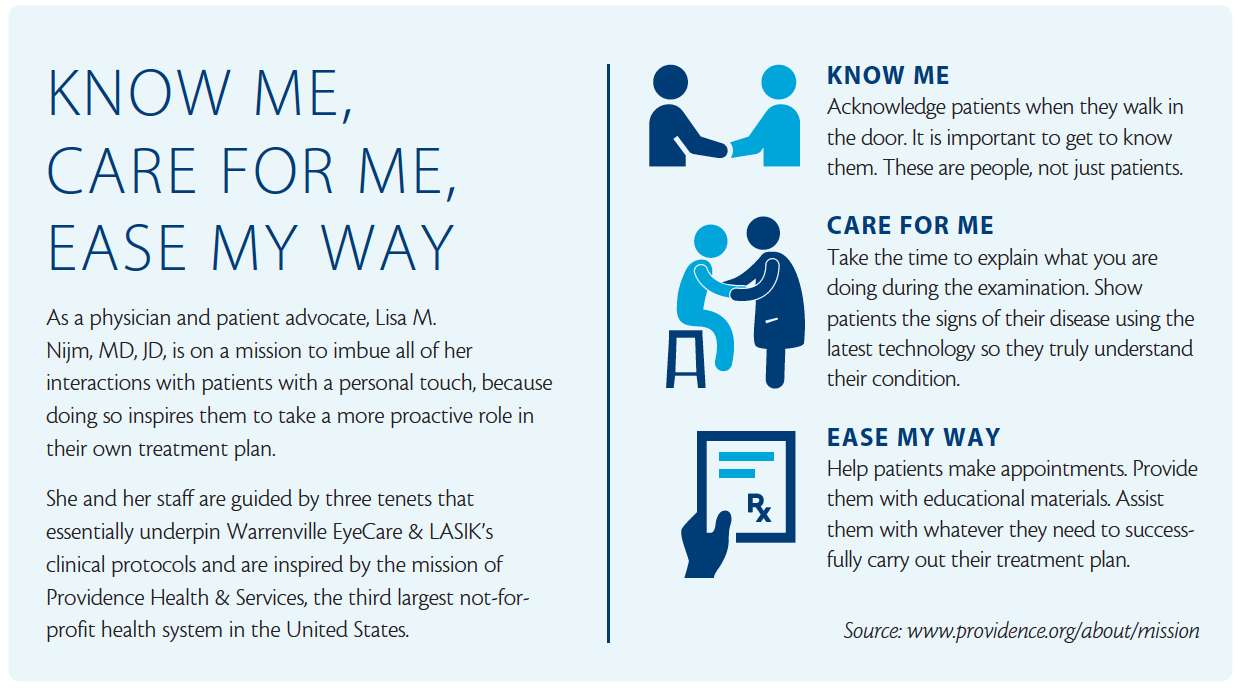
A crucial element of the practice’s success is teamwork. “Make sure your staff is well educated,” Dr. Nijm recommends. “It sounds obvious, but the information your staff relays to patients can have a great effect on your patients’ comfort and confidence in care.” Teamwork also means helping the staff, when needed, regardless of the task. “When we are busy and a phone needs to be answered, my patients are pleasantly surprised when they find out it’s me picking up the phone,” she says. Dr. Nijm adds, “I’m not above pitching in. I think it’s crucial to remember that, although the quarterback calls the shots, they are still part of the team.”
Now that Warrenville EyeCare is almost a 5-year-old established practice, Dr. Nijm’s days of marketing via cookie distribution are a quaint recollection. “Today, we are spending our marketing dollars strategically—updating our website to better highlight what sets our practice apart and expanding our social media initiatives,” she remarks. That said, Dr. Nijm stresses that her best referrals still stem from word-of-mouth. “Patients bring their families in, and they refer their friends,” she comments. “It’s the greatest compliment we can get.”
Dr. Nijm has had offers to join five of the ophthalmology practices that she reached out to in Warrenville EyeCare’s early days. “I must be doing something right,” she says. The young surgeon’s list of achievements and appointments and her practice’s exponential growth suggest that she is doing just about everything right.
ADVOCATE AND EDUCATOR
In addition to infusing her bedside manner with a personal touch, Dr. Nijm pursues opportunities to help her patients outside the office by voicing their concerns to bring about change on the state and national level. “Once I decided to become an ophthalmologist, my goal was to utilize my educational background to advocate for patients,” she explains. For instance, she has used her legal training to help legislators shape health care policies that benefit patients and preserve the physician-patient relationship. In recognition of her work, she was nominated to serve as a member on the OPHTHPAC committee for the American Academy of Ophthalmology, and for the past several years, she has served as one of four representatives from the American Academy of Ophthalmology to the American Medical Association. “We’ve gone to Capitol Hill every year to advocate for Medicare beneficiaries, veteran’s eye care, and vision research funding, among other things,” she explains.
WOMEN IN OPHTHALMOLOGY: GROWING IN NUMBER AND STRENGTH
Lisa M. Nijm, MD, JD, did such a fantastic job presiding over her local Women Ophthalmologists of the Windy City (WOW) group—growing membership and facilitating dynamic fall and spring meetings—that the national Women in Ophthalmology (WIO) group took notice and nominated her to be on its board of directors. Furthermore, she was invited to be a chairperson and plan its annual meeting, August 10 to 13, in San Diego.
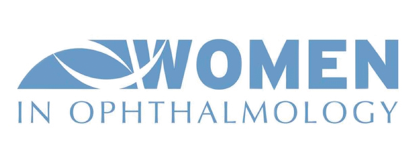
“Thankfully, I had a lot of success with the WOW group, and that caught the attention of the national WIO association,” she says. “I’m grateful to have the opportunity to apply and expand what I’ve learned in planning WOW’s meetings to designing the 4-day WIO summer symposium. The goal is to transform the meeting to include plenty of opportunities for discussion and leadership workshops on topics of greatest interest to women ophthalmologists. I have worked diligently to create a unique educational program that includes the latest in ophthalmic innovation as well as experts who can address the practical aspects of small business ownership in ophthalmology. Ultimately, the aim is to create a fellowship environment where we can all learn from each other.”
The endeavor has been work intensive and time-consuming but worth every minute, according to Dr. Nijm. “It’s been an incredible experience,” she explains. “I’ve created a leadership development summit and put the focus on topics that I feel have contributed to success in developing my own practice such as leadership skills, having crucial conversations with patients, and effectively negotiating one’s worth.” The meeting also includes workshops and presentations on practice-related health policy issues, practice management, health and wellness, and technology and innovation, among other things. For more information about WIO, email info@wioonline.org, or visit www.wioonline.org or https://www.facebook.com/wioonline.
Dr. Nijm is also one of the directors of the Osler Ophthalmology Board Review course, a national board review course that helps ophthalmologists prepare for written and oral board examinations. She leads the course for more than 450 young ophthalmologists each year. Dr. Nijm was initially recruited as a faculty member in 2012, and after just 1 year of teaching, she was asked to become the course’s codirector. She is the most frequently requested instructor (by the attendees), and her lectures were selected for inclusion in the audio version of the course, because they received higher marks than those of any other lecturer in the past 5 years. Dr. Nijm serves as adjunct faculty at the University of Illinois Eye and Ear Infirmary, and she has lectured to many residency and fellowship programs across the country on topics such as contract negotiations, successfully transitioning from residency to practice, and using the latest corneal technologies in practice. “In order to teach a subject, you have to know it very well, so being heavily involved in teaching naturally transcends to better patient care,” she says.
Dr. Nijm is making a name for herself locally and nationally. In her geographical area, complex cases are often referred to her for an additional level of scrutiny. Sharp diagnostic skills and surgical precision have become her trademark. She is also recognized for her unique perspective on both clinical and patient-advocacy issues. “Throughout my career, I’ve been told by patients, colleagues, and industry that my approach is different: I tend to be an out-of-the box thinker,” she says. “Certainly, some of this comes from my unique educational background, but I have also had the privilege of being trained by some of the greatest professors in ophthalmology, and for that, I am very grateful.” Her ultimate goal of using her education, training, and experience to help patients, both inside and outside of the office, has evolved into a fulfilling career. As Dr. Nijm explains, “I end up wearing a lot of different hats—from physician to advocate to educator.”
WOMEN IN OPHTHALMOLOGY
Dr. Nijm also wears the hat of the “female ophthalmologist” in a specialty where women are still underrepresented despite their growing ranks and female ophthalmology practice owners are still somewhat of an anomaly. She notes that there are unique challenges to being a female ophthalmologist and practice CEO and says she is trying to mitigate them by working in leadership roles at organizations dedicated to strengthening the role of women in the ophthalmic arena (see Women in Ophthalmology: Growing in Number and Strength). Dr. Nijm is the president and chairwoman of Women Ophthalmologists of the Windy City, a state branch of the national group, Women in Ophthalmology, of which she is a chairwoman and organizer of its annual summer symposium. Dr. Nijm is enthusiastic about the strides these groups have made, and she brings that excitement to bear on all of her initiatives.
How does she find the time to run a growing patient-focused solo practice, navigate the legislative process, teach a board review course, add expert opinions to challenging cases, and retain leading roles in local and national ophthalmology associations? “One of the most important things I learned from the years spent as an employee ophthalmologist in other practices before I opened Warrenville EyeCare & LASIK is that, when you are on your own, you may be responsible for more things, but you have much more flexibility, and that can lend itself to greater efficiency,” Dr. Nijm says. “I spend a lot of time doing things after hours and on weekends, but when it’s your own practice, everything you do for your patients is so rewarding. It is certainly more work than being an employee, but the autonomy that it offers is priceless.”

